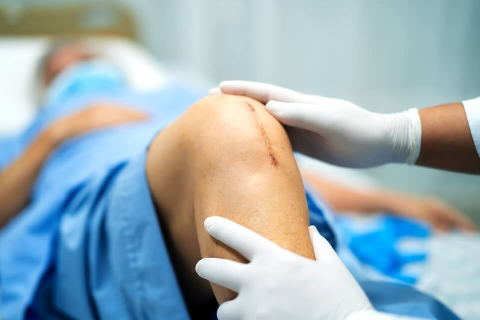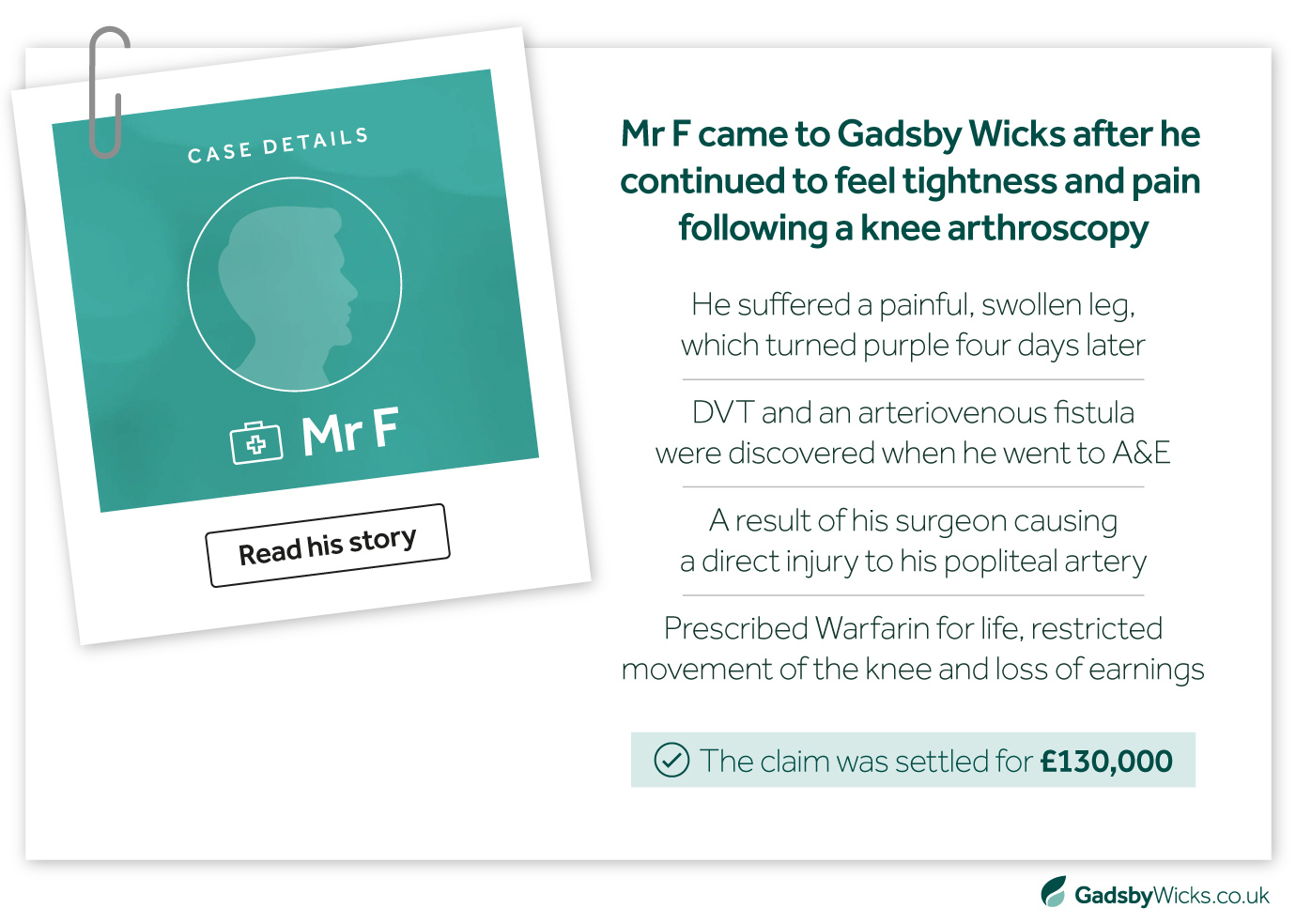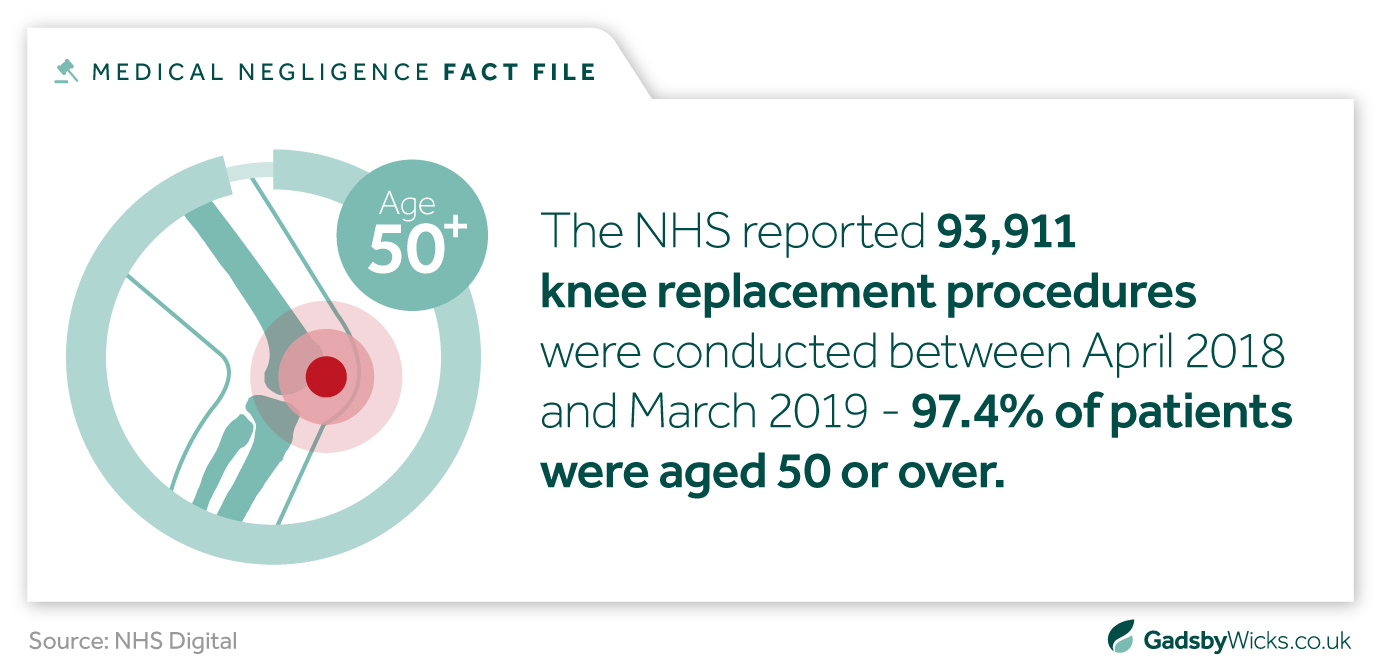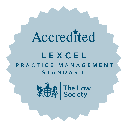- Home >
- Surgical Negligence Claims >
- Knee Surgery Claims
Knee surgery is a common procedure to treat serious injuries, improve mobility and reduce pain. But when things don’t go to plan before, during or after your operation, you can sustain injuries that change your life forever.
As specialist medical negligence solicitors with over 30 years of experience, we are proven experts at handling all knee surgery claims. With a strong track record of helping claimants secure millions in compensation, we can give you the closure and security you need to move past what happened to you.

Do you have a knee surgery claim?
While most knee surgeries are completed competently, mistakes can and do happen. From fitting the wrong-sized prosthetics to permanently damaging nerves and blood vessels, negligent acts can significantly impact your future.
Be it restricted movement, ongoing pain, or even the need to amputate, every choice a surgeon makes can have serious repercussions on your life. If you believe you have suffered due to these decisions, it is important to work with a legal team you can trust to fight your case and secure the compensation you are owed.

The specialist knee surgery claims solicitors for Essex & East Anglia
Since 1993, we have solely focused on representing claimants hurt by medical mistakes. We’re one of England's best clinical negligence law firms, winning millions in compensation and settling 96% of cases out of court.
Taking a meticulous, sensitive approach to investigating your claim, we find answers to what happened during your knee procedure and negotiate the right settlement. We do this on a ‘no win, no fee’ basis – you pay nothing unless your knee surgery claim is successful. Zero financial, complete peace of mind.
What does our knee surgery claims process look like?

A free initial consultation
Call us, request a callback or complete our online form and we’ll assess if you have a valid medical negligence claim.

Funding your claim
Discover the ways we can fund your claim without you paying a penny at any stage of the process.

Investigating evidence
We gather medical records, witness statements and more to learn what happened to you and prove your claim.

Instructing independent medical experts
We work with impartial, experienced medical experts to establish whether your injuries were due to substandard medical care.

Valuing your claim
We assess your health and financial losses to accurately estimate how much compensation your claim is worth.

Presenting your case
We contact the Defendants and the Courts on your behalf to set out your allegations and receive a response.

Negotiating a settlement
We work to achieve a fair settlement for you outside the courtroom – this is how 96% of our cases end.

Preparing for Trial
If we must proceed to Trial, we fully prepare you for what to expect so you receive the right result in court.
FAQs about knee surgery negligence claims
What can go wrong during knee surgery?
Knee surgery is a type of orthopaedic surgical procedure, similar to hip replacements or other types of joint surgery. Every decision a surgeon makes can impact the patient during knee reconstruction and replacements. A lapse in concentration or error in judgement can have significant consequences, from reduced or complete loss of function in the knee, or in the most severe cases, amputation.
Complications that can occur during these knee surgeries include:
- Replacement ligaments being too long or too short, which can lead to instability while standing and moving, or reduced movement in the knee
- Creating a tunnel in the bone to pass new tissue through in the wrong area, leading to future problems
- The prosthesis selected being too large or too small for the patient, resulting in pain, limited mobility or instability
- An infection developing through an open wound during surgery, which could be transferred through a prosthesis
- The surgeon damages nerves or blood vessels, which if left undetected could cause muscle wastage or permanent nerve death
If you or a loved one has been affected by any of the above situations or another complication during knee surgery, we can help you secure the compensation that you deserve for any pain, suffering or loss of amenity experienced.
It is important to note that if the prosthesis implemented during surgery malfunctions, and the surgeon could not have foreseen this, this would not be a surgical negligence claim. Instead, it would be a product liability claim.
How do you prove a knee injury claim?
When investigating a knee surgery claim, we will also work with an impartial knee surgeon, who is both actively working and understands the legal and medical tests we require of them. Their expertise helps us to determine:
- Whether your surgeon or another healthcare professional breached their duty of care towards you
- Whether your surgeon’s actions or inactions directly caused the pain and suffering you experienced
- How your circumstances have changed, and what support you need moving forward
This insight plays a crucial role in proving that your injuries were due to negligence, and quantifying the value of your compensation claim.

View our National and Essex Medical Negligence Statistics post for more industry insight.
How can knee surgery claim compensation help me?
While compensation cannot undo what happened to you, it can provide essential financial assistance to help you in everyday life. This includes (but is not limited to):
- Further surgeries and corrective procedures
- Ongoing therapies, such as physiotherapy and hydrotherapy
- Adaptations to the home, such as stairlifts and wet rooms
- Adaptations to vehicles
- Aids and equipment, such as walking sticks, crutches and wheelchairs
- Loss of earnings
Our experienced team works tirelessly to achieve the outcome you deserve, so you can return to the position you were in before your injury or, where this is not possible, to help you and your family adjust to life after your injuries.
Our case study on Mr F is a helpful example of how the compensation awarded in a knee surgery claim is determined based on the unique repercussions on the claimant. Mr F struggled with ongoing tightness and pain following a knee arthroscopy.

He suffered a painful, swollen leg, which turned purple four days later. DVT and an arteriovenous fistula were discovered when he went to A&E, caused by his surgeon directly injuring his popliteal artery.
As a result, Mr F was prescribed Warfarin for life, and suffered restricted movement of the knee, diminishing his welfare and his ability to earn a living. By carefully examining the evidence and presenting the best case possible, we achieved a settlement of £130,000.
How long can knee surgery negligence claims take to settle?
We don’t like to put a timeline on medical negligence claims, as each is unique and the time to resolution can vary greatly. The timeline can also be affected by:
- The stance taken by the Defendants
- How long it takes for medical experts to reach their answers
How long do I have to make a knee surgery compensation claim?
Generally, a knee injury compensation claim must be made within three years of when the injury was noticed. However, children making a claim have until their 21st birthday, and there is no time limit for anyone who is mentally incapacitated.
Furthermore, the court has discretion to allow a claim to be brought out of time. Contact us or complete our online claims form and we can discuss your specific circumstances.
How common are knee-related problems?
Knee-related injuries can generally be divided into two areas:
- Injuries related to wear and tear
- Sudden acute injuries caused by trauma
Over time, our knee joints are subjected to a great deal of wear and tear. Whether it is walking to and from the shops, or bending while we sit at our desk chairs, these types of injuries are typically most prominent in older people or those with an active lifestyle.
This wear and tear can gradually cause the knee joint and ligaments to deteriorate, leading to persistent pain, instability and limited movement.
Knee injuries can also be caused by sudden trauma, such as a road traffic accident, slipping on a wet surface, or falling off a ladder. This impact could cause muscle and ligament tears, fractures, and further damage that can only be resolved by knee surgery.
The NHS reported 93,911 knee replacement procedures between April 2018 and March 2019 – 97.4% of these patients were aged 50 or over.

Contact our expert knee surgery claims solicitors
If you or a loved one have experienced substandard knee surgery and would like to speak to someone about your options, our team is here to listen and advise you on your next steps.

Lexcel accredited medical negligence claims solicitors
We are proud to be a Lexcel-accredited practice. The accreditation is a mark of quality and comes directly from the Law Society.
A recent assessment described us as a “Centre of Excellence” and we continue to operate to the highest standards across all main areas of our field. These include client care, case management, financial management, structure and strategy, people management, risk management, information management and file management.







